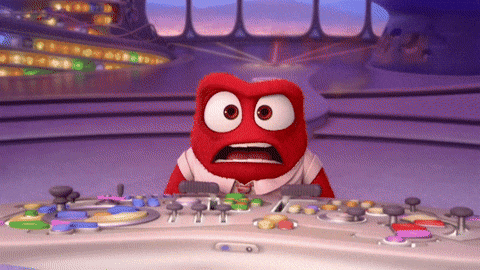Is it Normal That My Inner Critic is So Loud?
No matter who you are and what you do, odds are you’ve heard ‘the voice’ before. You know, that little voice in your head that pipes up every now and then and criticises what you’re doing? Tells you it’s wrong, or not worth doing, or that you’re not smart enough to do it. That voice is your inner critic, and it’s generally a nasty little thing. But having one is very normal, and a lot of people can just ignore it and go about their lives.
But what about when that inner critic is just so damn loud that you don’t know what to do? For this I turned to my friend and colleague Helen Barker, a fellow coach who challenges people to be just that little bit braver every day. Helen is all about helping women rediscover those passions they were too afraid to pursue thanks to the little voice in their heads, and making those forgotten dreams a reality!
I wanted to take a look at where our inner critics come from, how their voices get so loud, and more importantly what we can do to manage them when they’re shouting in our heads. And Helen is just the perfect person to chat to about this, so let’s get into it!
What we’ll cover:
Are you aware of the voice?
Where the inner critic comes from
The inner critic and domestic life
Gender differences
How to manage your inner critic
Prefer to listen? Head to the podcast here.
Meet Helen:
Helen is a Life Coach who help people who want to be braver in their day to day life, stop people pleasing, start feeling confident in making their own decisions and build their self esteem and confidence. Check her out braveryoucoaching.com
Are you Aware of the Voice?
The inner critic voice is like a yellow car. It’s one of those things that you might not notice right away, but once you realise it’s there, you can’t stop noticing it! And more importantly, the amount of sheer crap it talks to you all day every day.
Oh you idiot, why did you say that?
You can’t do that thing.
What will people think?
Why did he look at me like that? What did I do?
Why are you procrastinating doing the thing? You’re so lazy.
Sometimes the voice is worried – it’s trying to protect you from embarrassment. Sometimes it’s just trying to process what’s going on around you (something I do a lot!). And sometimes it gets downright nasty. And even though only around 50% of people have an ‘inner monologue’ running all the time, everyone has felt the influence of that inner critic, even if they aren’t aware of it at the time.
The first step towards managing that inner critic – especially when it’s being loud and negative – is becoming aware of it. Personally, I didn’t really become aware of it until I came out of a toilet cubicle one day. There was another lady waiting for the stall, and she looked at me and said ‘was that you whispering?’ Obviously she was concerned about a random whispering in the toilets, but I was mortified! I always thought I was just processing the things going on around me, but it turns out I was actually whispering to myself! And actually, now that we’ve been in lockdown so long, that barrier has broken, and I try to vocalise a lot of these thoughts with my boyfriend.
“We have more conversations on a daily basis with ourselves... it’s worth looking at the content.”
As Helen puts it, we have more conversations with ourselves on a daily basis than anyone else. Which is why it’s worth looking at the content. Because if I walk into a room to get something, get distracted and leave without it, how will thinking ‘you’re a bloody idiot’ ever make me feel positive in my own abilities?
The clue is in the name here – your inner critic is a critic! And while sometimes that can be helpful, most of the time it isn’t. Helen explained it wonderfully:
‘What alerted me to my inner critic was actually one of my friends. I have a really well developed inner critic, and I was externalising it to the point that I was saying ‘oh yeah, but I’m not, I can’t do this’ constantly in compensation, sort of in a self-deprecating way. And one of my braver friends said to me ‘Helen, you’re being really harsh on yourself, what is your problem?’ It was really bold and stark.’
Becoming aware of, and understanding the inner critic can be a hugely empowering thing – it was for me. And it can help us start to understand why we think the way we do, and move towards taming some of those more negative thoughts.
Where Does The Inner Critic Come From?
Here’s the thing. We don’t have the inner voice as children. We don’t worry about how we’d be perceived, or internalise every mistake we make. We’re in the moment, experiencing what we’re doing without any other thoughts. So when does the inner critic start to form, and how does it grow so loud over time?
We aren’t born with it, it’s created from our own thoughts, and we are responsible for it in some ways. For me, I think my inner critic came from comparison, particularly in my early romantic life, when I was a bit all over the place about choosing partners, and then comparing myself to them all the time. And it took me a long time to realise that that’s what the inner voice was, and what it was doing. Helen had similar experiences with comparison too – so I wonder how much of our inner critics come from comparison, and how much happier we could all be if we just focussed on doing our own thing?
Would you Say That to a Friend?
Once she realised how negative and loud her inner critic was, Helen did a lot of reading into the psychology of it, and into the reasons behind it – which all boiled down to two things. Self-worth and self-esteem.
‘I had really been struggling with both self-worth and self-esteem at the time, and when I listened to a few audiobooks on the subject I realised it often comes out of how you talk to yourself. One of the really common things that came up was ‘would you say that to a friend?. Probably not, because a lot of the things the inner critic says aren’t very nice! But how can you be a friend to yourself, build up that self-worth and self-esteem, if you’re constantly ripping yourself to pieces? You can’t. your self-esteem will just slowly erode until you have no confidence at all. And that’s what made me realise that the inner critic was really contributing to my low self-esteem, and it was really limiting me.
“I would never say that to some else, so why am I saying it to myself?”
I added. “ I went to a yoga workshop called ‘Embody Love’, and one of the exercises was to write down all of the critical things we thought about our bodies on post-it notes. And then we had to stand in front of a partner, look them in the eyes and say each one, and stick the post-it to that part of their body. And that was so powerful, because you realise, I would never, ever say that to someone else. So why I am saying it to myself?’
Helen also pointed out that if you’re British this can be even more of a challenge, because we are brought up into a culture of self-deprecating humour, and a culture where we don’t really celebrate our own successes. And so we are more naturally biased towards negativity. So on the few occasions someone does say something to you, or when you do screw something up, you cling to that, and it becomes your story and your narrative. Is it any wonder our inner critics are so negative?
The Inner Critic and Domestic Life
If you sit and think about it, are there areas in your life when the inner critic comes out more than others? For myself and for Helen, the big one is domestic life. Helen describes herself as a keen cook, but not so inclined to other areas of domestic life – like cleaning. But when she sees friends who excel in those areas, her inner critic comes out guns blazing. She will hear the voice saying ‘you’re lazy’, ‘why don’t you find this easy like everyone else?’ ‘Why can’t you just prioritise this?’ In a very loud, shouty way. In a ‘I just want to hide under the blankets’ kind of way. And honestly, I’ve been there too.
But the question is – how many men have those thoughts about domestic life? Because even though we strive for equality, women are still expected by society to be the domestic ones, and men simply don’t face the same pressures as women in the home. Which means they aren’t likely to get this side of the inner critic. That’s reserved for the social pressures women face.
Gender Differences For The Inner Critic
During our talk, Helen made a really, amazing profound point about the inner critic and success that I just couldn’t not include. She said that:
‘If you ask a successful woman at the top of her field – CEO, actress, whatever – why they are there, you’ll get a speech peppered with apologetics. I was just in the right place at the right time. I was just lucky. But if you have a bloke who is extremely successful, they will absolutely own that success. And they will say yeah, I’m here because I work really hard, because I’m good at what I do. And it all goes back to the way we’re treated as children – as babies even. The way people respond when a little boy cries compared to a little girl is very different, and I think we start to absorb those messages early on in life. So much of the way we criticise ourselves comes from external sources, with the way we grew up being the biggest one of all.’
And she is bang on the money with that one. True, I think women should be able to just own their success like men do – but I don’t think the inner critic will let many of them do that yet. There’s still a lot of work to be done there. And it starts, as Helen said, when we’re young. Our families form a huge part of who we are, including that inner critic. So the way your family acted, commented and criticised both you and themselves becomes your inner voice. It’s just part of being a human being.
Managing Your Inner Critic
Sometimes that inner voice in your head can be helpful, or at least make you stop and think about something for a few seconds longer before you act! But most of the time, your inner critic is just a bit of a dick, so you need to step in and take control if you want to turn down the volume. I asked Helen what some of her favourite ways of managing the inner critic were, and here were her answers:
‘I try to take notice when my inner critic is being loud, or very negative. And when I do, I will say to myself – sometimes out loud – hey, stop. Just stop. Sometimes I might even have a conversation with the critic, trying to rationalise what it’s saying and proving that it isn’t true. I do this in my head, or I write it down sometimes too. I’m essentially having a debate with myself, looking at the evidence the critic has for its opinion, and the positive evidence I have. And often that’s enough to stop me spiralling and realise the inner voice is talking shit.’
I definitely agree that it can be helpful to think of your inner critic as an actual person. A tiny human living in your brain, occasionally sending these negative messages into your consciousness. I do a similar thing to Helen, but I take it one step further. I absolutely write down these things in my journal, and when I’m struggling with similar thoughts or issues, I go back and look at the rationalisation, the evidence, and the celebration of success I’ve written down, and the critic goes quiet.
You’re giving yourself the tools to check in with your thoughts, assess and handle them in a mature and rational way, which is the best way to deal with the irrational voice of your inner critic. It’s also a really good way to build you your self-esteem and focus on the positives as well, so I thoroughly recommend trying it!
If you’ve made it this far – thank you! I hope you’ve got some nuggets of reassurance from this blog, and the realisation that you’re not alone in having all of those voices in your head judging and criticising you. I’ll actually be talking more about the inner critic soon – about how you can use play to overcome it and make yourself feel better about yourself, and maybe even make the critic a little kinder.
For now, I encourage you to exercise some of that self-compassion and find a place of quietness when it comes to your inner critic. I’ll see you next time, and in the meantime if you have any questions for me or Helen, you can find her here and get in touch with me here.















I help late diagnosed ADHD folk make career and life decisions they trust. ICF Certified Coach, Youtuber & Writer.